#apps
Text

this is a team manjeet blog. if you're team bobir i hope terrible things happen to you.
28 notes
·
View notes
Text
I don't wanna connect more shit to my phone. I already depend on this stupid black rectangle for too much. I don't want a coffee pot that I control with Bluetooth. I don't want to scan a QR code to see a restaurant menu. I don't want to download an app to order a fucking pizza or schedule a doctor's appointment. I don't want to get redirected to download an app when they could have made a site that would be perfectly functional as a web browser. I don't want to give my phone number and verify with a text message to sign up for something. I want less reasons to grab my phone, not more.
30 notes
·
View notes
Text
Was tagged by @captastra to do this picrew!
Here are Victoire and Marazhai!


Tagging @arendaes, @mathlann, @dujour13
22 notes
·
View notes
Text
How lock-in hurts design

Berliners: Otherland has added a second date (Jan 28) for my book-talk after the first one sold out - book now!

If you've ever read about design, you've probably encountered the idea of "paving the desire path." A "desire path" is an erosion path created by people departing from the official walkway and taking their own route. The story goes that smart campus planners don't fight the desire paths laid down by students; they pave them, formalizing the route that their constituents have voted for with their feet.
Desire paths aren't always great (Wikipedia notes that "desire paths sometimes cut through sensitive habitats and exclusion zones, threatening wildlife and park security"), but in the context of design, a desire path is a way that users communicate with designers, creating a feedback loop between those two groups. The designers make a product, the users use it in ways that surprise the designer, and the designer integrates all that into a new revision of the product.
This method is widely heralded as a means of "co-innovating" between users and companies. Designers who practice the method are lauded for their humility, their willingness to learn from their users. Tech history is strewn with examples of successful paved desire-paths.
Take John Deere. While today the company is notorious for its war on its customers (via its opposition to right to repair), Deere was once a leader in co-innovation, dispatching roving field engineers to visit farms and learn how farmers had modified their tractors. The best of these modifications would then be worked into the next round of tractor designs, in a virtuous cycle:
https://securityledger.com/2019/03/opinion-my-grandfathers-john-deere-would-support-our-right-to-repair/
But this pattern is even more pronounced in the digital world, because it's much easier to update a digital service than it is to update all the tractors in the field, especially if that service is cloud-based, meaning you can modify the back-end everyone is instantly updated. The most celebrated example of this co-creation is Twitter, whose users created a host of its core features.
Retweets, for example, were a user creation. Users who saw something they liked on the service would type "RT" and paste the text and the link into a new tweet composition window. Same for quote-tweets: users copied the URL for a tweet and pasted it in below their own commentary. Twitter designers observed this user innovation and formalized it, turning it into part of Twitter's core feature-set.
Companies are obsessed with discovering digital desire paths. They pay fortunes for analytics software to produce maps of how their users interact with their services, run focus groups, even embed sneaky screen-recording software into their web-pages:
https://www.wired.com/story/the-dark-side-of-replay-sessions-that-record-your-every-move-online/
This relentless surveillance of users is pursued in the name of making things better for them: let us spy on you and we'll figure out where your pain-points and friction are coming from, and remove those. We all win!
But this impulse is a world apart from the humility and respect implied by co-innovation. The constant, nonconsensual observation of users has more to do with controlling users than learning from them.
That is, after all, the ethos of modern technology: the more control a company can exert over its users ,the more value it can transfer from those users to its shareholders. That's the key to enshittification, the ubiquitous platform decay that has degraded virtually all the technology we use, making it worse every day:
https://pluralistic.net/2023/02/19/twiddler/
When you are seeking to control users, the desire paths they create are all too frequently a means to wrestling control back from you. Take advertising: every time a service makes its ads more obnoxious and invasive, it creates an incentive for its users to search for "how do I install an ad-blocker":
https://www.eff.org/deeplinks/2019/07/adblocking-how-about-nah
More than half of all web-users have installed ad-blockers. It's the largest consumer boycott in human history:
https://doc.searls.com/2023/11/11/how-is-the-worlds-biggest-boycott-doing/
But zero app users have installed ad-blockers, because reverse-engineering an app requires that you bypass its encryption, triggering liability under Section 1201 of the Digital Millennium Copyright Act. This law provides for a $500,000 fine and a 5-year prison sentence for "circumvention" of access controls:
https://pluralistic.net/2024/01/12/youre-holding-it-wrong/#if-dishwashers-were-iphones
Beyond that, modifying an app creates liability under copyright, trademark, patent, trade secrets, noncompete, nondisclosure and so on. It's what Jay Freeman calls "felony contempt of business model":
https://locusmag.com/2020/09/cory-doctorow-ip/
This is why services are so horny to drive you to install their app rather using their websites: they are trying to get you to do something that, given your druthers, you would prefer not to do. They want to force you to exit through the gift shop, you want to carve a desire path straight to the parking lot. Apps let them mobilize the law to literally criminalize those desire paths.
An app is just a web-page wrapped in enough IP to make it a felony to block ads in it (or do anything else that wrestles value back from a company). Apps are web-pages where everything not forbidden is mandatory.
Seen in this light, an app is a way to wage war on desire paths, to abandon the cooperative model for co-innovation in favor of the adversarial model of user control and extraction.
Corporate apologists like to claim that the proliferation of apps proves that users like them. Neoliberal economists love the idea that business as usual represents a "revealed preference." This is an intellectually unserious tautology: "you do this, so you must like it":
https://boingboing.net/2024/01/22/hp-ceo-says-customers-are-a-bad-investment-unless-they-can-be-made-to-buy-companys-drm-ink-cartridges.html
Calling an action where no alternatives are permissible a "preference" or a "choice" is a cheap trick – especially when considered against the "preferences" that reveal themselves when a real choice is possible. Take commercial surveillance: when Apple gave Ios users a choice about being spied on – a one-click opt of of app-based surveillance – 96% of users choice no spying:
https://arstechnica.com/gadgets/2021/05/96-of-us-users-opt-out-of-app-tracking-in-ios-14-5-analytics-find/
But then Apple started spying on those very same users that had opted out of spying by Facebook and other Apple competitors:
https://pluralistic.net/2022/11/14/luxury-surveillance/#liar-liar
Neoclassical economists aren't just obsessed with revealed preferences – they also love to bandy about the idea of "moral hazard": economic arrangements that tempt people to be dishonest. This is typically applied to the public ("consumers" in the contemptuous parlance of econospeak). But apps are pure moral hazard – for corporations. The ability to prohibit desire paths – and literally imprison rivals who help your users thwart those prohibitions – is too tempting for companies to resist.
The fact that the majority of web users block ads reveals a strong preference for not being spied on ("users just want relevant ads" is such an obvious lie that doesn't merit any serious discussion):
https://www.iccl.ie/news/82-of-the-irish-public-wants-big-techs-toxic-algorithms-switched-off/
Giant companies attained their scale by learning from their users, not by thwarting them. The person using technology always knows something about what they need to do and how they want to do it that the designers can never anticipate. This is especially true of people who are unlike those designers – people who live on the other side of the world, or the other side of the economic divide, or whose bodies don't work the way that the designers' bodies do:
https://pluralistic.net/2022/10/20/benevolent-dictators/#felony-contempt-of-business-model
Apps – and other technologies that are locked down so their users can be locked in – are the height of technological arrogance. They embody a belief that users are to be told, not heard. If a user wants to do something that the designer didn't anticipate, that's the user's fault:
https://www.wired.com/2010/06/iphone-4-holding-it-wrong/
Corporate enthusiasm for prohibiting you from reconfiguring the tools you use to suit your needs is a declaration of the end of history. "Sure," John Deere execs say, "we once learned from farmers by observing how they modified their tractors. But today's farmers are so much stupider and we are so much smarter that we have nothing to learn from them anymore."
Spying on your users to control them is a poor substitute asking your users their permission to learn from them. Without technological self-determination, preferences can't be revealed. Without the right to seize the means of computation, the desire paths never emerge, leaving designers in the dark about what users really want.
Our policymakers swear loyalty to "innovation" but when corporations ask for the right to decide who can innovate and how, they fall all over themselves to create laws that let companies punish users for the crime of contempt of business-model.
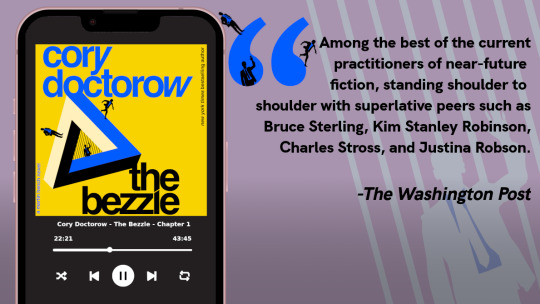
I'm Kickstarting the audiobook for The Bezzle, the sequel to Red Team Blues, narrated by @wilwheaton! You can pre-order the audiobook and ebook, DRM free, as well as the hardcover, signed or unsigned. There's also bundles with Red Team Blues in ebook, audio or paperback.

If you'd like an essay-formatted version of this post to read or share, here's a link to it on pluralistic.net, my surveillance-free, ad-free, tracker-free blog:
https://pluralistic.net/2024/01/24/everything-not-mandatory/#is-prohibited

Image:
Belem (modified)
https://commons.wikimedia.org/wiki/File:Desire_path_%2819811581366%29.jpg
CC BY 2.0
https://creativecommons.org/licenses/by/2.0/deed.en
#pluralistic#desire paths#design#drm#everything not mandatory is prohibited#apps#ip#innovation#user innovation#technological self-determination#john deere#twitter#felony contempt of business model
3K notes
·
View notes
Text
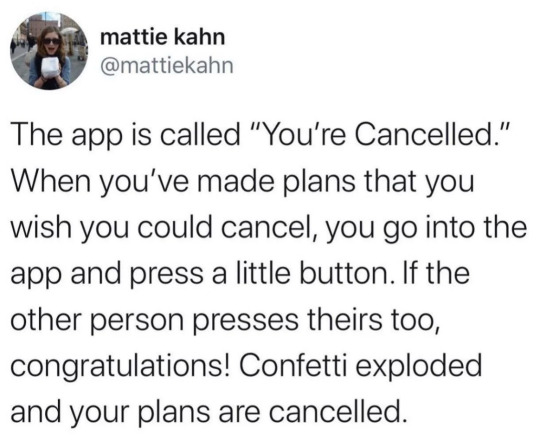
5K notes
·
View notes
Text









like or reblog if you save/use!🌈
#rainbow#pngs#transparents#aesthetic#moodboard#rentry#carrd#resources#neocities#colorful#layouts#moodboards#messy#icons#png#transparent#tamagotchi#food#ios#apps#heartcore#camera#crayons#kawaii#graphics#blog material#headers#rainbowcore#colorfulcore#kidcore
3K notes
·
View notes
Text

#atla#avatar the last airbender#avatar#lok#avatar aang#avatar kyoshi#legend of korra#kyoshi#zuko#aang#azula#princess azula#Ty Lee#apps#sokka#katara
1K notes
·
View notes
Text
we could have mobile games like cool math duck life and papas pizzeria and bloonz tower defense and old masterpieces like original angry birds and jet pack joyride and small online games like webkinz home before dark and polar bear plunge and flash games like holeio and snake and we could have barbie dress up and horse riding and we could have them all without thousands of shitty 2 minute ads and microtransactions and unskippable popups and imbedded app store links and we could have new games new incredible story based adventures, puzzles, well designed mini platformers, we have an entire universe of unexplored medium right here in the palm of your hand! we could have REAL games! real wonderful games not misleading not clickbait we could have everything in the whole wide world and we could have them them on the phone! WE COULD HAVE THEM ON THE PHONE !!!!!!!!!!! DOES IT NOT MAKE YOU SICK???? DOES IT NOT SHATTER YOUR HEART !!!!
#cool math games#duck life#meeblings#papas pizzeria#bloonz tower defense#angry birds#jet pack joyride#hole io#snake#webkinz#home before dark#polar bear plunge#apps#games#video games#mobile games#text#sorry i am just feeling suddenly extremely passionate about the lost age of app games and internet games
2K notes
·
View notes
Text
Linux apps have some of the strangest names, I swear. Like, you'll be scrolling your package manager and see an app called "Pussy Torture Chamber" with an icon of a cartoon vagina in chains, and then you find out it's the most beautiful, open-source, free to use, indie-developed, professional-grade, quality of life word processor that's ever existed.
1K notes
·
View notes
Text
An app to avoid at all costs: Calmara
It claims to use AI to analyze, uh, pictures of human anatomy to determine if you’ve got an STI. To put it mildly, this has… implications.
Warning: article contains dick jokes and shaved cat butts.
305 notes
·
View notes
Text
Welcome to a directory of all official brands on Tumblr. Here you’ll find links to your favorite brand:
Entertainment
Media
Tech
Publications
Sports
Products
Apps
Services
Influencers
Please submit your own — especially active brand blogs — to help complete the directory! Submissions must include a mobile screenshot of the blog's header with notification bar cropped out, and a plaintext link to the blog (ideal format: https://www.tumblr.com/[blog url]). Please tag one or more categories and tag 'active' if the blog has posted within the last year!
If a link directs you outside of the app or triggers a log-in page, please let us know which post has caused the problem so it can be amended!
Please remember that branded blogs are run by workers.
#info#entertainment#media#publications#sports#products#apps#services#influencers#tech#active#deactivated
3K notes
·
View notes
Text
AO3 DOES NOT HAVE ANY OFFICIAL APP OR DOWNLOADABLE PLATFORM.
AO3 DOES NOT AND WILL NEVER CHARGE YOU TO VIEW OR ACCESS ANY AO3 CONTENT.
AO3 IS NOT A PAY-TO-USE OR PAY-TO-VIEW APP.
LITERALLY ANY DOWNLOADABLE APP CLAIMING TO BE AO3 AND/OR HOSTING AO3 CONTENT BEHIND A PAYWALL IS NOTHING BUT MINED (STOLEN) CONTENT OFF OF AO3 THAT AN INDEPENDANT PERSON IS PROFITING OFF OF.
#sephiroth speaks#myfandomrealitea#fandom#not discourse#ao3#fanfiction#fanfic#apps#ao3 app#people keep suggesting ao3 “apps” and “downloadables” without realizing its literally just scraped content being sold off or used for ads#archiveofourown
381 notes
·
View notes
Text
The best free software
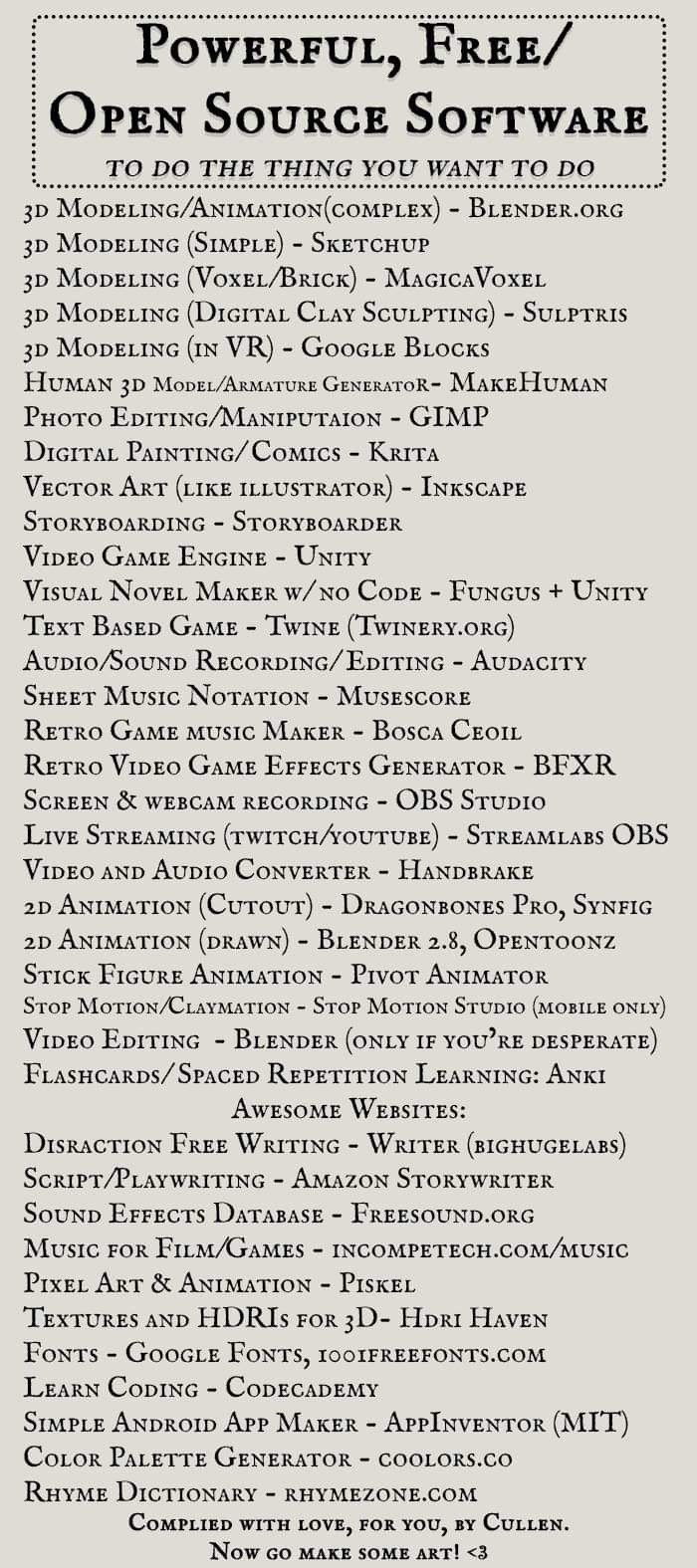
1K notes
·
View notes
Text
When Facebook came for your battery, feudal security failed
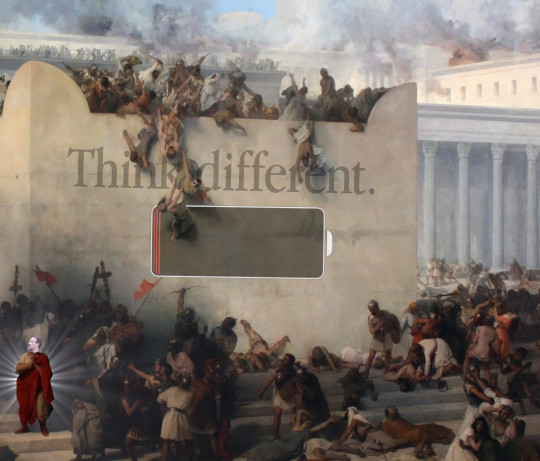
When George Hayward was working as a Facebook data-scientist, his bosses ordered him to run a “negative test,” updating Facebook Messenger to deliberately drain users’ batteries, in order to determine how power-hungry various parts of the apps were. Hayward refused, and Facebook fired him, and he sued:
https://nypost.com/2023/01/28/facebook-fires-worker-who-refused-to-do-negative-testing-awsuit/
If you’d like an essay-formatted version of this post to read or share, here’s a link to it on pluralistic.net, my surveillance-free, ad-free, tracker-free blog:
https://pluralistic.net/2023/02/05/battery-vampire/#drained
Hayward balked because he knew that among the 1.3 billion people who use Messenger, some would be placed in harm’s way if Facebook deliberately drained their batteries — physically stranded, unable to communicate with loved ones experiencing emergencies, or locked out of their identification, payment method, and all the other functions filled by mobile phones.
As Hayward told Kathianne Boniello at the New York Post, “Any data scientist worth his or her salt will know, ‘Don’t hurt people…’ I refused to do this test. It turns out if you tell your boss, ‘No, that’s illegal,’ it doesn’t go over very well.”
Negative testing is standard practice at Facebook, and Hayward was given a document called “How to run thoughtful negative tests” regarding which he said, “I have never seen a more horrible document in my career.”
We don’t know much else, because Hayward’s employment contract included a non-negotiable binding arbitration waiver, which means that he surrendered his right to seek legal redress from his former employer. Instead, his claim will be heard by an arbitrator — that is, a fake corporate judge who is paid by Facebook to decide if Facebook was wrong. Even if he finds in Hayward’s favor — something that arbitrators do far less frequently than real judges do — the judgment, and all the information that led up to it, will be confidential, meaning we won’t get to find out more:
https://pluralistic.net/2022/06/12/hot-coffee/#mcgeico
One significant element of this story is that the malicious code was inserted into Facebook’s app. Apps, we’re told, are more secure than real software. Under the “curated computing” model, you forfeit your right to decide what programs run on your devices, and the manufacturer keeps you safe. But in practice, apps are just software, only worse:
https://pluralistic.net/2022/06/23/peek-a-boo/#attack-helicopter-parenting
Apps are part what Bruce Schneier calls “feudal security.” In this model, we defend ourselves against the bandits who roam the internet by moving into a warlord’s fortress. So long as we do what the warlord tells us to do, his hired mercenaries will keep us safe from the bandits:
https://locusmag.com/2021/01/cory-doctorow-neofeudalism-and-the-digital-manor/
But in practice, the mercenaries aren’t all that good at their jobs. They let all kinds of badware into the fortress, like the “pig butchering” apps that snuck into the two major mobile app stores:
https://arstechnica.com/information-technology/2023/02/pig-butchering-scam-apps-sneak-into-apples-app-store-and-google-play/
It’s not merely that the app stores’ masters make mistakes — it’s that when they screw up, we have no recourse. You can’t switch to an app store that pays closer attention, or that lets you install low-level software that monitors and overrides the apps you download.
Indeed, Apple’s Developer Agreement bans apps that violate other services’ terms of service, and they’ve blocked apps like OG App that block Facebook’s surveillance and other enshittification measures, siding with Facebook against Apple device owners who assert the right to control how they interact with the company:
https://pluralistic.net/2022/12/10/e2e/#the-censors-pen
When a company insists that you must be rendered helpless as a condition of protecting you, it sets itself up for ghastly failures. Apple’s decision to prevent every one of its Chinese users from overriding its decisions led inevitably and foreseeably to the Chinese government ordering Apple to spy on those users:
https://pluralistic.net/2022/11/11/foreseeable-consequences/#airdropped
Apple isn’t shy about thwarting Facebook’s business plans, but Apple uses that power selectively — they blocked Facebook from spying on Iphone users (yay!) and Apple covertly spied on its customers in exactly the same way as Facebook, for exactly the same purpose, and lied about it:
https://pluralistic.net/2022/11/14/luxury-surveillance/#liar-liar
The ultimately, irresolvable problem of Feudal Security is that the warlord’s mercenaries will protect you against anyone — except the warlord who pays them. When Apple or Google or Facebook decides to attack its users, the company’s security experts will bend their efforts to preventing those users from defending themselves, turning the fortress into a prison:
https://pluralistic.net/2022/10/20/benevolent-dictators/#felony-contempt-of-business-model
Feudal security leaves us at the mercy of giant corporations — fallible and just as vulnerable to temptation as any of us. Both binding arbitration and feudal security assume that the benevolent dictator will always be benevolent, and never make a mistake. Time and again, these assumptions are proven to be nonsense.
Image:
Anthony Quintano (modified)
https://commons.wikimedia.org/wiki/File:Mark_Zuckerberg_F8_2018_Keynote_%2841118890174%29.jpg
CC BY 2.0:
https://creativecommons.org/licenses/by/2.0/deed.en
[Image ID: A painting depicting the Roman sacking of Jerusalem. The Roman leader's head has been replaced with Mark Zuckerberg's head. The wall has Apple's 'Think Different' wordmark and an Ios 'low battery' icon.]
Next week (Feb 8-17), I'll be in Australia, touring my book *Chokepoint Capitalism* with my co-author, Rebecca Giblin. We'll be in Brisbane on Feb 8, and then we're doing a remote event for NZ on Feb 9. Next is Melbourne, Sydney and Canberra. I hope to see you!
https://chokepointcapitalism.com/
#pluralistic#manorial security#feudal security#apple#mobile#apps#security through obscurity#binding arbitration#arbitration waivers#transparency#danegeld#surveillance lag
4K notes
·
View notes
Text

844 notes
·
View notes
Text
For all of five seconds I considered getting Threads, then I remembered why I left Facebook about a decade ago:
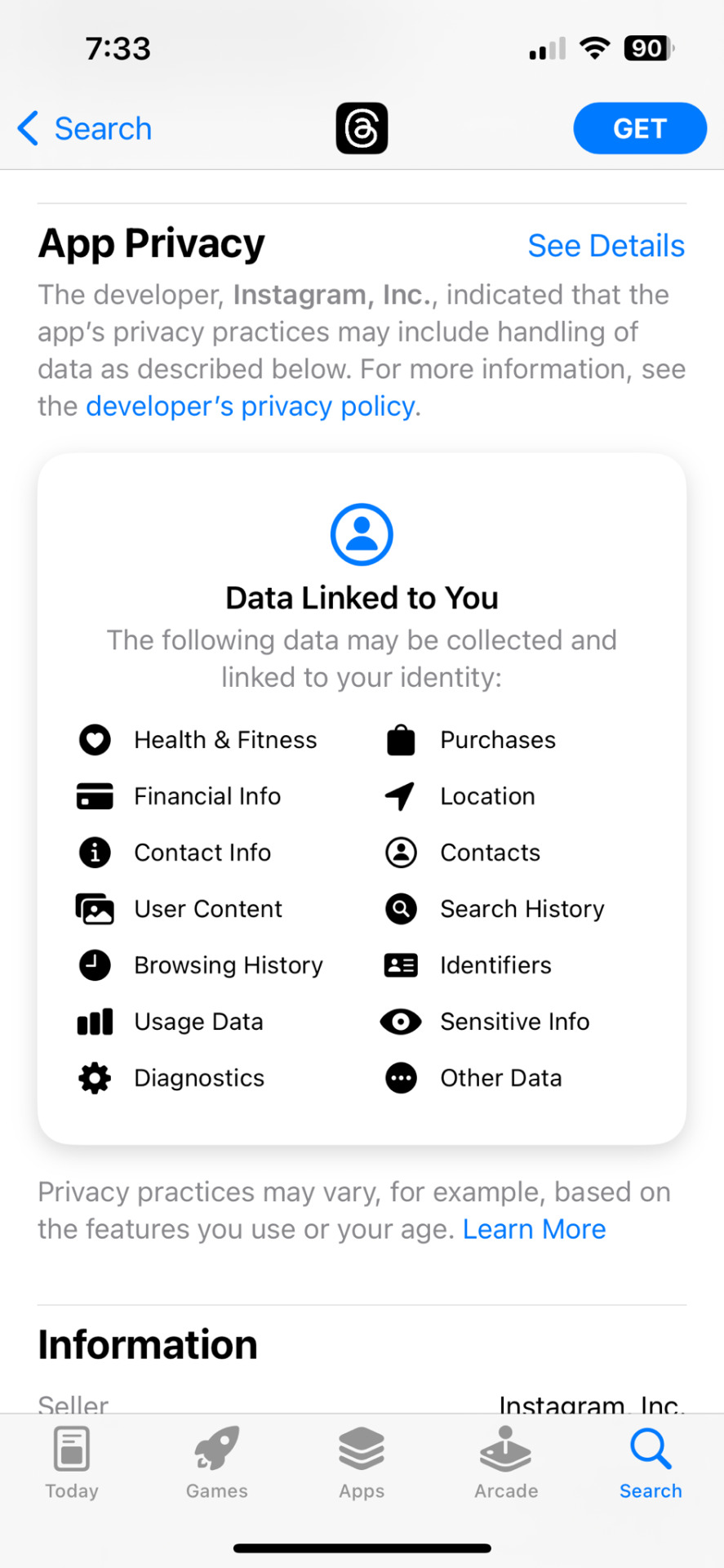
Why on earth would a Twitter-clone need my health data, financial info, and other sensitive data? And all of it linked to me? What a scumbag app
637 notes
·
View notes